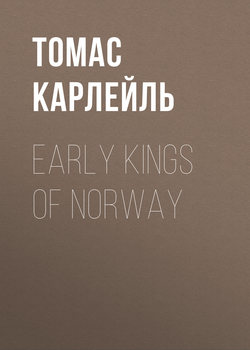Читать книгу Early Kings of Norway - Томас Карлейль - Страница 7
CHAPTER VI. OLAF TRYGGVESON
ОглавлениеHakon, in late times, had heard of a famous stirring person, victorious in various lands and seas, latterly united in sea-robbery with Svein, Prince Royal of Denmark, afterwards King Svein of the Double-beard ("Zvae Skiaeg", Twa Shag) or fork-beard, both of whom had already done transcendent feats in the viking way during this copartnery. The fame of Svein, and this stirring personage, whose name was "Ole," and, recently, their stupendous feats in plunder of England, siege of London, and other wonders and splendors of viking glory and success, had gone over all the North, awakening the attention of Hakon and everybody there. The name of "Ole" was enigmatic, mysterious, and even dangerous-looking to Hakon Jarl; who at length sent out a confidential spy to investigate this "Ole;" a feat which the confidential spy did completely accomplish,—by no means to Hakon's profit! The mysterious "Ole" proved to be no other than Olaf, son of Tryggve, destined to blow Hakon Jarl suddenly into destruction, and become famous among the heroes of the Norse world.
Of Olaf Tryggveson one always hopes there might, one day, some real outline of a biography be written; fished from the abysses where (as usual) it welters deep in foul neighborhood for the present. Farther on we intend a few words more upon the matter. But in this place all that concerns us in it limits itself to the two following facts first, that Hakon's confidential spy "found Ole in Dublin;" picked acquaintance with him, got him to confess that he was actually Olaf, son of Tryggve (the Tryggve, whom Blood-axe's fierce widow and her sons had murdered); got him gradually to own that perhaps an expedition into Norway might have its chances; and finally that, under such a wise and loyal guidance as his (the confidential spy's, whose friendship for Tryggveson was so indubitable), he (Tryggveson) would actually try it upon Hakon Jarl, the dissolute old scoundrel. Fact second is, that about the time they two set sail from Dublin on their Norway expedition, Hakon Jarl removed to Trondhjem, then called Lade; intending to pass some months there.
Now just about the time when Tryggveson, spy, and party had landed in Norway, and were advancing upon Lade, with what support from the public could be got, dissolute old Hakon Jarl had heard of one Gudrun, a Bonder's wife, unparalleled in beauty, who was called in those parts, "Sunbeam of the Grove" (so inexpressibly lovely); and sent off a couple of thralls to bring her to him. "Never," answered Gudrun; "never," her indignant husband; in a tone dangerous and displeasing to these Court thralls; who had to leave rapidly, but threatened to return in better strength before long. Whereupon, instantly, the indignant Bonder and his Sunbeam of the Grove sent out their war-arrow, rousing all the country into angry promptitude, and more than one perhaps into greedy hope of revenge for their own injuries. The rest of Hakon's history now rushes on with extreme rapidity.
Sunbeam of the Grove, when next demanded of her Bonder, has the whole neighborhood assembled in arms round her; rumor of Tryggveson is fast making it the whole country. Hakon's insolent messengers are cut in pieces; Hakon finds he cannot fly under cover too soon. With a single slave he flies that same night;—but whitherward? Can think of no safe place, except to some old mistress of his, who lives retired in that neighborhood, and has some pity or regard for the wicked old Hakon. Old mistress does receive him, pities him, will do all she can to protect and hide him. But how, by what uttermost stretch of female artifice hide him here; every one will search here first of all! Old mistress, by the slave's help, extemporizes a cellar under the floor of her pig-house; sticks Hakon and slave into that, as the one safe seclusion she can contrive. Hakon and slave, begrunted by the pigs above them, tortured by the devils within and about them, passed two days in circumstances more and more horrible. For they heard, through their light-slit and breathing-slit, the triumph of Tryggveson proclaiming itself by Tryggveson's own lips, who had mounted a big boulder near by and was victoriously speaking to the people, winding up with a promise of honors and rewards to whoever should bring him wicked old Hakon's head. Wretched Hakon, justly suspecting his slave, tried to at least keep himself awake. Slave did keep himself awake till Hakon dozed or slept, then swiftly cut off Hakon's head, and plunged out with it to the presence of Tryggveson. Tryggveson, detesting the traitor, useful as the treachery was, cut off the slave's head too, had it hung up along with Hakon's on the pinnacle of the Lade Gallows, where the populace pelted both heads with stones and many curses, especially the more important of the two. "Hakon the Bad" ever henceforth, instead of Hakon the Rich.
